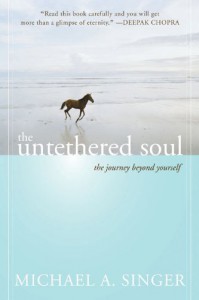Currently reading
The Art of Fiction: A Guide for Writers and Readers
The Name of the Rose
Ghostwritten
To the Lighthouse
The Decline and Fall of the Roman Empire
Gödel, Escher, Bach: An Eternal Golden Braid
Perfect Wrong Note - Learning to Trust Your Musical Self
The Prince
The Varieties of Religious Experience
Twenty Questions: An Introduction to Philosophy
Untethered Soul: The Journey Beyond Yourself
 The idea that I like the most from Eastern style thought is that resisting the way things are is crazy. There's a voice in my, and probably everyone else's, head that never shuts up. I'm fine with that and don't feel a huge need to silence it, but a lot of the time what it's saying (what I'm saying to myself?) is pretty dumb. The voice constantly explains and reframes what I experience to make it feel safer or more comprehensible. It resists what it doesn't understand and tries to explain it away or come up with elaborate justifications for why stuff doesn't fit in with The Way Things Should Be. It demands resolution to anything that doesn't fit my mental model and it creates areas in my mind that are forbidden or painful to visit then tries to push those areas away so they'll be uncovered as seldom as possible. All these elaborate thought tricks work sometimes, but the idea of The Untethered Soul (and similar books) is that the tricks are unnecessary and detrimental to finding peace. Maybe if I let the voice inside my head keep up its constant chatter, but choose to just recognize what it's saying without either rejecting it or mentally canonizing it, I can be okay with what's happening even without understanding and categorizing every bit of it.I feel like that way of looking at my thoughts lets me experience both negative emotions like anger and hate as well as positive emotions in a way that doesn't have side effects like anxiety or attachment. It keeps me focused on what I'm doing which results in me doing things better. It helps me deal with situations that I don't like by freeing up mental energy that would normally be spent resisting the problem and letting me instead use that energy to resolve it.Even though I like the idea, I still mostly don't think this way. I tell and re-tell myself the story of how things are and why they're that way and how I'm going to fix them later and forget where I am and what I'm doing. That's why I read books like this, to remind me that there is a better way.
The idea that I like the most from Eastern style thought is that resisting the way things are is crazy. There's a voice in my, and probably everyone else's, head that never shuts up. I'm fine with that and don't feel a huge need to silence it, but a lot of the time what it's saying (what I'm saying to myself?) is pretty dumb. The voice constantly explains and reframes what I experience to make it feel safer or more comprehensible. It resists what it doesn't understand and tries to explain it away or come up with elaborate justifications for why stuff doesn't fit in with The Way Things Should Be. It demands resolution to anything that doesn't fit my mental model and it creates areas in my mind that are forbidden or painful to visit then tries to push those areas away so they'll be uncovered as seldom as possible. All these elaborate thought tricks work sometimes, but the idea of The Untethered Soul (and similar books) is that the tricks are unnecessary and detrimental to finding peace. Maybe if I let the voice inside my head keep up its constant chatter, but choose to just recognize what it's saying without either rejecting it or mentally canonizing it, I can be okay with what's happening even without understanding and categorizing every bit of it.I feel like that way of looking at my thoughts lets me experience both negative emotions like anger and hate as well as positive emotions in a way that doesn't have side effects like anxiety or attachment. It keeps me focused on what I'm doing which results in me doing things better. It helps me deal with situations that I don't like by freeing up mental energy that would normally be spent resisting the problem and letting me instead use that energy to resolve it.Even though I like the idea, I still mostly don't think this way. I tell and re-tell myself the story of how things are and why they're that way and how I'm going to fix them later and forget where I am and what I'm doing. That's why I read books like this, to remind me that there is a better way.












